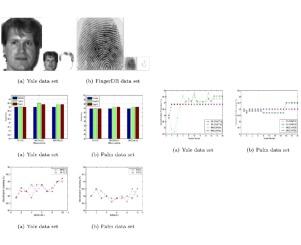MRCCA: A novel CCA based method and its application in feature extraction and fusion for matrix data |
| |
| Affiliation: | 1. Heritage Institute of Technology, Kolkata, India;2. Institute of Radiophysics and Electronics, Kolkata, India;1. Dipartimento di Ingegneria Elettrica Elettronica e Informatica, University of Catania, Italy;2. Dipartimento di Matematica e Informatica, University of Catania, Italy;1. Department of Electrical Engineering, COMSATS Institute of Information Technology, Attock, Campus, Attock Pakistan;2. Department of Mathematics, Preston University, Kohat, Islamabad Campus, Pakistan;3. Department of Mathematical Sciences, UAE University, Al-Ain, Box 1551, United Arab Emirates;4. Department of Mathematics, Saint Xavier University, Chicago, IL 60655, United States;1. Artificial Intelligence Research Institute (IIIA-CSIC), Campus UAB, Bellaterra, Spain;2. Computer Science Department, Universitat Politècnica de Catalunya – BarcelonaTech, Barcelona, Spain;1. Dpt. of Computer Architecture and Communications, University of Extremadura, Spain;2. Dpt. of Computer Architecture and Automation, Complutense University of Madrid, Spain;3. Dpt. of Computer Science, King Juan Carlos University, Spain |
| |
| Abstract: | 
Multiset features extracted from the same pattern usually represent different characteristics of data, meanwhile, matrices or 2-order tensors are common forms of data in real applications. Hence, how to extract multiset features from matrix data is an important research topic for pattern recognition. In this paper, by analyzing the relationship between CCA and 2D-CCA, a novel feature extraction method called multiple rank canonical correlation analysis (MRCCA) is proposed, which is an extension of 2D-CCA. Different from CCA and 2D-CCA, in MRCCA k pairs left transforms and k pairs right transforms are sought to maximize correlation. Besides, the multiset version of MRCCA termed as multiple rank multiset canonical correlation analysis (MRMCCA) is also developed. Experimental results on five real-world data sets demonstrate the viability of the formulation, they also show that the recognition rate of our method is higher than other methods and the computing time is competitive. |
| |
| Keywords: | Matrix data Canonical correlation analysis (CCA) Multiset canonical correlation analysis (MCCA) Two-dimensional CCA (2D-CCA) Feature extraction Feature fusion Pattern recognition |
| 本文献已被 ScienceDirect 等数据库收录! |
|

